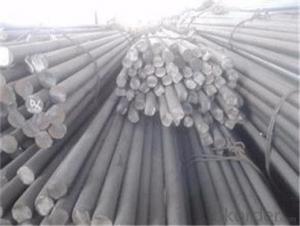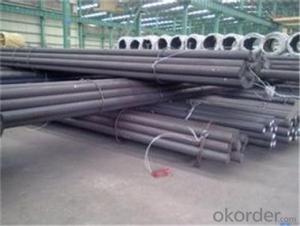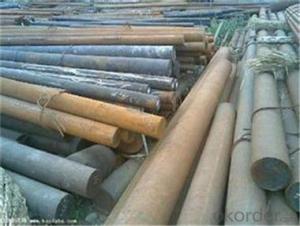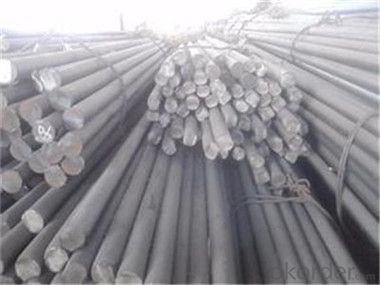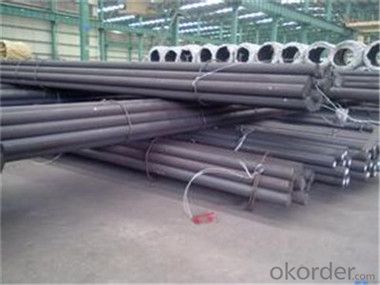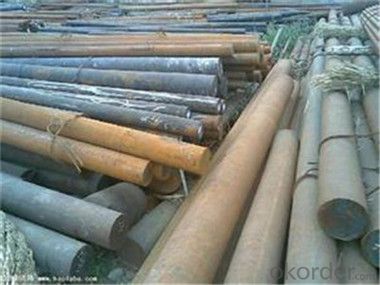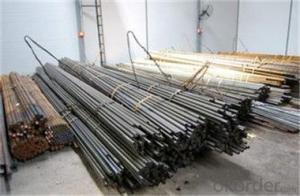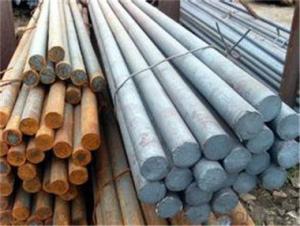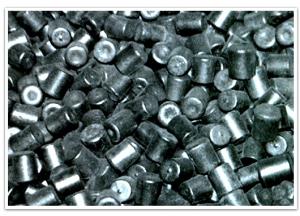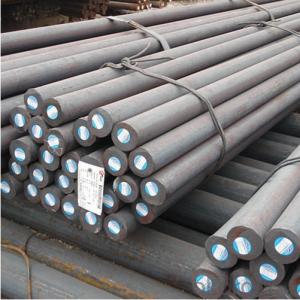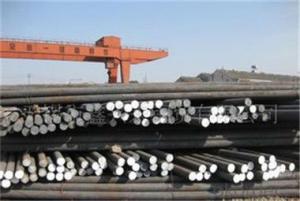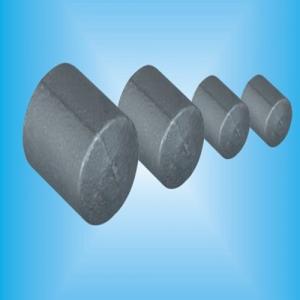Hard Chrome Carbon Steel Bar with Good Quality-CNBM
- Loading Port:
- Tianjin
- Payment Terms:
- TT OR LC
- Min Order Qty:
- 666 m.t.
- Supply Capability:
- 2000000 m.t./month
OKorder Service Pledge
OKorder Financial Service
You Might Also Like
Description of steel round bar:
1.Diameter 80 to 800 mm
2.Black or Bright surface
Festures of steel round bar:
4340 Forged Round Steel Bar
1.Dia 80-800mm Length:2000-13000mm or as required
2.Technique:Forged
3.Delivery Time:45 days
Specifications of steel round bar:
Description |
Carbon Steel Rod/Carbon Steel Bar,carbon steel rod,carbon steel shaft,mild steel bar, mild steel shaft,ms bar | |
Material | ASTM | 1005,1006,1008,1010,1015,1020,1025,1030,1035,1040,1045,1050,1055,1060,1065,1070,1080,1084, 1016,1022 |
DIN | Ck10,Ck15,Ck22,Ck25,Ck30,Ck35,Ck40,Ck45,Ck50, 30Mn4,40Mn4 | |
BS | 040A04,095M15,045M10,080A40,045M10,080M50 | |
Standard | GB/T799,ASTM A29,A108,A321,A575,BS970,DIN1652,JIS G4051 | |
Section shape |
Round | |
Length |
As your required | |
Application | Carbon steel rod applies to chemical industry, shipping industry, manufacturing industry,construction,decorate Industry,electric power, pump shafts, sanitary wares,furniture handles,boiler,high temperature resistant,low temperature resistant, corrosion resistant. | |
Images of steel round bar:
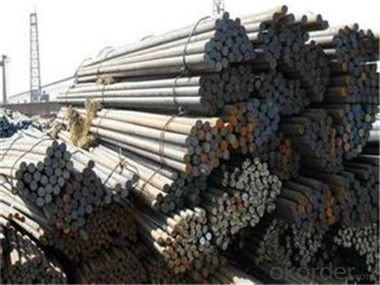
FAQ:
1. What is your package?
Packing situation: standard seaworthy packing or as customer required.
2. How long is the lead time?
Delivery time: 45 days after order confirmed.
3. What payment term do you accept?
Payment: T/T or L/C at sight.
- Q: What are the typical price ranges for steel round bars?
- The typical price ranges for steel round bars can vary depending on various factors such as the type of steel, the diameter, length, and the quantity being purchased. Generally, steel round bars can range in price from $1 to $5 per foot for common carbon steel grades. However, specialty and high-grade steel round bars can be priced higher, ranging from $5 to $20 per foot or even more. Additionally, larger diameter or longer length steel round bars may also be priced higher due to increased material and manufacturing costs. It is important to note that these price ranges are approximate and can vary based on market conditions, supplier pricing, and other factors. To get an accurate price range, it is recommended to contact steel suppliers or distributors for specific quotes based on your requirements.
- Q: Can steel round bars be heat treated to improve their mechanical properties?
- Yes, steel round bars can be heat treated to improve their mechanical properties. Heat treatment involves heating the steel to a specific temperature and then cooling it at a controlled rate. This process can alter the microstructure of the steel, resulting in improved hardness, strength, and toughness. Different heat treatment methods, such as quenching and tempering, can be applied depending on the desired mechanical properties.
- Q: What is the fatigue strength of a steel round bar?
- The fatigue strength of a steel round bar refers to its ability to withstand repeated loading and unloading cycles without experiencing failure. It is a measure of the maximum stress that the bar can endure without developing cracks or fractures due to fatigue. The fatigue strength of a steel round bar depends on various factors such as the material composition, surface condition, size, and manufacturing process.
- Q: What is the carbon content in steel round bars?
- The carbon content in steel round bars varies depending on the grade and type of steel being used. Generally, carbon steel round bars contain carbon in the range of 0.08% to 1.5%. Higher carbon content provides increased strength and hardness, but it also decreases weldability and ductility. The specific carbon content in steel round bars is determined during the manufacturing process and can be specified by the customer based on their desired mechanical properties and application requirements.
- Q: How are steel round bars used in the manufacturing of hydraulic cylinders?
- Steel round bars are a crucial component in the manufacturing of hydraulic cylinders due to their strength, durability, and versatility. These round bars are typically made from carbon steel, alloy steel, or stainless steel, which are all known for their high tensile strength and resistance to corrosion. The first step in using steel round bars for hydraulic cylinders is the selection of the appropriate diameter and length. The diameter of the round bar determines the overall strength of the hydraulic cylinder, and the length determines its size and capacity. Once the desired dimensions are determined, the steel round bars are cut to the required length using specialized cutting tools. Next, the steel round bars undergo a series of processes to shape them into the necessary components of a hydraulic cylinder. This includes machining, drilling, and turning operations to create features such as threaded ends, grooves, and mounting surfaces. These processes are carried out with precision to ensure the round bars meet the exact specifications of the hydraulic cylinder design. After the shaping processes, the steel round bars are heat-treated to enhance their mechanical properties. Heat treatment involves heating the round bars to a specific temperature and then rapidly cooling them to achieve the desired hardness, toughness, and dimensional stability. This step is crucial in ensuring the hydraulic cylinders can withstand the high pressures and forces they will encounter during operation. Once the steel round bars have been shaped and heat-treated, they are further processed to achieve the desired surface finish. This can involve processes such as grinding, polishing, or coating to improve the round bars' appearance and resistance to corrosion. The surface finish is important for ensuring smooth operation and preventing any potential leaks or damage to the hydraulic cylinder. Finally, the steel round bars are assembled with other components such as piston rods, cylinder heads, and seals to complete the hydraulic cylinder. These assemblies are carried out using advanced welding or fastening techniques to ensure the components are securely attached and can withstand the forces and pressures exerted during hydraulic operation. In summary, steel round bars play a vital role in the manufacturing of hydraulic cylinders by providing the necessary strength, durability, and versatility required for these critical components. From the initial selection of the appropriate diameter and length to the shaping, heat treatment, and assembly processes, the use of steel round bars ensures the hydraulic cylinders can effectively transmit hydraulic power while withstanding the demanding conditions they are designed for.
- Q: How are steel round bars used in the construction of offshore structures?
- Steel round bars are commonly used in the construction of offshore structures due to their high strength and durability. These bars are often used as reinforcement in concrete structures, providing added strength and stability to the overall framework. Additionally, they can be used as support beams and columns, ensuring the structural integrity of offshore platforms, oil rigs, and other marine infrastructure. The corrosion-resistant properties of steel further make it an ideal choice for withstanding harsh marine environments.
- Q: What are the common applications of steel round bars?
- Steel round bars have numerous common applications across various industries. One common application is in construction, where steel round bars are used for structural support in buildings, bridges, and other infrastructure projects. They are also commonly used in the automotive industry for manufacturing of components such as axles, crankshafts, and suspension systems. Additionally, steel round bars find applications in the manufacturing of machinery, tools, and equipment due to their strength and durability. They are also utilized in the production of furniture, appliances, and various hardware products.
- Q: Can steel round bars be used for making heat exchangers?
- Yes, steel round bars can be used for making heat exchangers. Steel is a commonly used material for heat exchangers due to its good thermal conductivity, strength, and resistance to corrosion. Round bars can be machined and formed into the desired shape for the heat exchanger, providing structural integrity and efficient heat transfer.
- Q: Are steel round bars susceptible to corrosion?
- Corrosion is a common issue for steel round bars, especially when they come into contact with moisture, oxygen, and certain chemicals. The degradation of the material occurs when the metal reacts with its surroundings. Steel, primarily composed of iron, can undergo different types of corrosion, including general corrosion, pitting corrosion, and stress corrosion cracking. When steel round bars are exposed to moisture and oxygen, they can experience general corrosion. This gradual deterioration manifests as the formation of an oxide layer on the surface, resulting in material loss and reduced strength over time. Pitting corrosion is another type that steel round bars may encounter. It involves localized damage on the metal's surface, leading to the creation of small pits. These pits can deepen and expand, compromising the structure and integrity of the bars. Stress corrosion cracking is a specific form of corrosion that affects steel round bars under tensile stress, in the presence of particular corrosive agents. This phenomenon can cause sudden material failure, even when stress levels are below the bars' yield strength. To combat corrosion, protective coatings and corrosion inhibitors are commonly applied to steel round bars. Methods like galvanization, where a layer of zinc is added, or the use of epoxy or paint coatings are often employed. Regular maintenance and proper storage practices are also important in preventing excessive exposure to corrosive elements. It is worth noting that the susceptibility to corrosion can vary depending on the grade and composition of the steel used for the round bars. Certain types of stainless steel, for instance, exhibit higher resistance to corrosion due to the presence of chromium and other alloying elements. In conclusion, while steel round bars can be vulnerable to corrosion, appropriate preventive measures can be implemented to minimize the risk and prolong their lifespan.
- Q: The difference between galvanized round bar and galvanized flat steel
- Galvanized round bar and galvanized flat steel are of different shapes and different uses.
Send your message to us
Hard Chrome Carbon Steel Bar with Good Quality-CNBM
- Loading Port:
- Tianjin
- Payment Terms:
- TT OR LC
- Min Order Qty:
- 666 m.t.
- Supply Capability:
- 2000000 m.t./month
OKorder Service Pledge
OKorder Financial Service
Similar products
Hot products
Hot Searches
Related keywords
